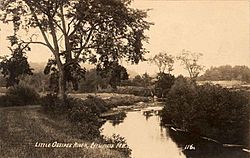Little Ossipee River facts for kids
Quick facts for kids Little Ossipee River |
|
|---|---|

The Little Ossipee River in Newfield, Maine
|
|
| Country | United States |
| Physical characteristics | |
| Main source | Maine |
The Little Ossipee River is a beautiful waterway in southwestern Maine, USA. It flows for about 33.7-mile-long (54.2 km) before joining a larger river called the Saco River. Think of it as a smaller stream that feeds into a bigger one!
Contents
Discover the Little Ossipee River
This river is an important part of the natural landscape in Maine. Rivers like the Little Ossipee are vital for many reasons. They provide homes for animals, offer places for people to enjoy nature, and help carry water across the land.
Where the Journey Begins
The Little Ossipee River starts its journey in a town called Newfield. It begins at the very edge of a place called Balch Pond. Imagine water gently spilling out of the pond and starting to flow downhill. That's where the river's adventure begins!
The River's Path
From Balch Pond, the river flows mostly towards the east. It passes through another body of water known as Shapleigh Pond. As it continues, it flows right past the small community of North Shapleigh.
Through Towns and Lakes
The river then helps mark the border between Newfield and the town of Shapleigh. It flows northeast for a bit, then goes back into Newfield, passing by the main part of the town.
Next, the Little Ossipee River turns east again. Here, it becomes the natural boundary between two more towns: Limerick to the north and Waterboro to the south.
It also flows through a larger body of water called Lake Arrowhead. This is a reservoir, which is like a big artificial lake, with a community built around its shores. After leaving Lake Arrowhead, the river continues its path, heading northeast and then north.
Where It Ends
Finally, the Little Ossipee River reaches the town of Limington. Near the village of East Limington, its long journey comes to an end. Here, it proudly joins the Saco River, adding its waters to the larger flow heading towards the ocean.
 | Claudette Colvin |
 | Myrlie Evers-Williams |
 | Alberta Odell Jones |

